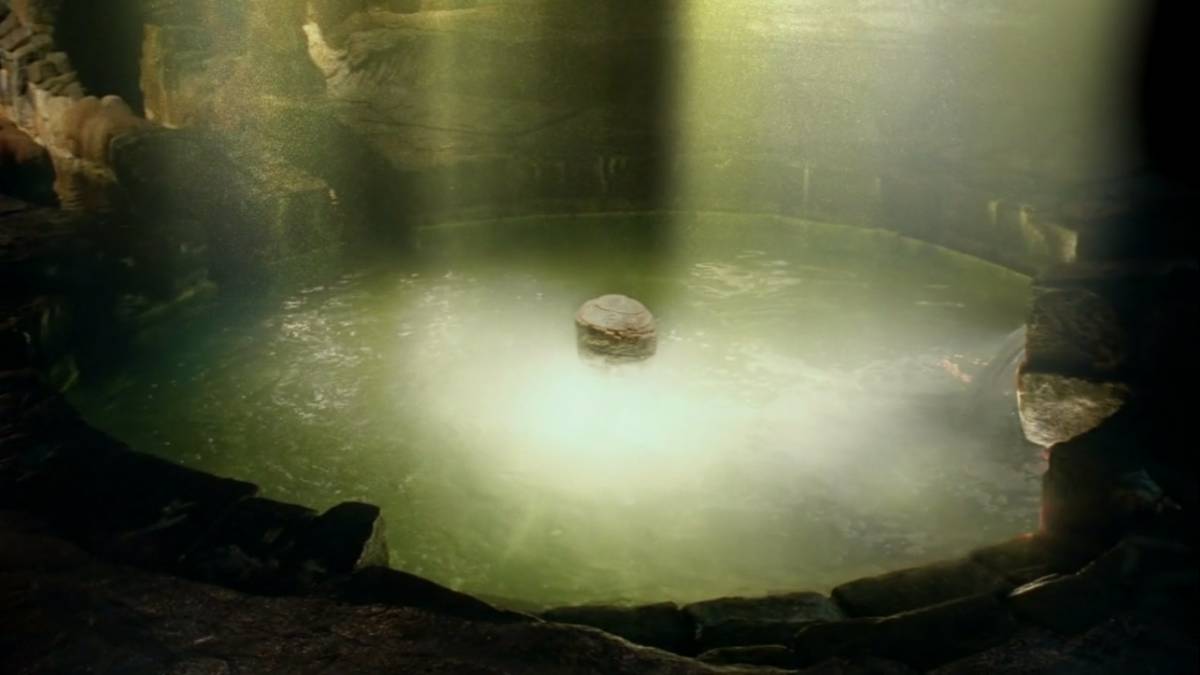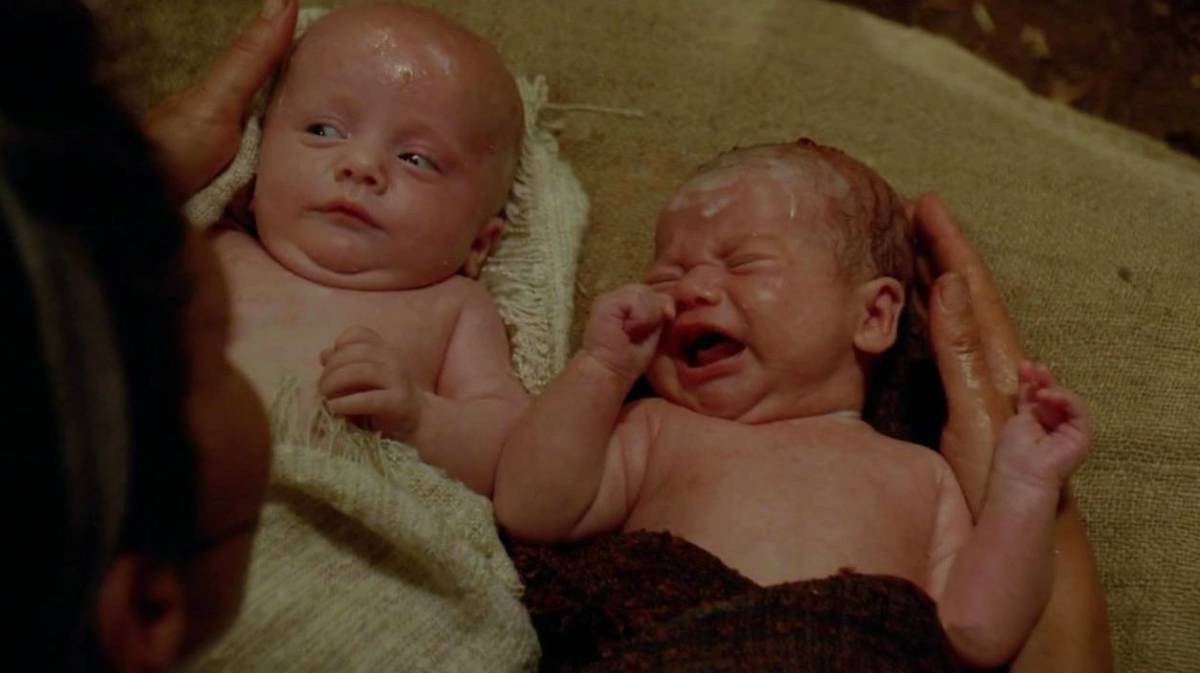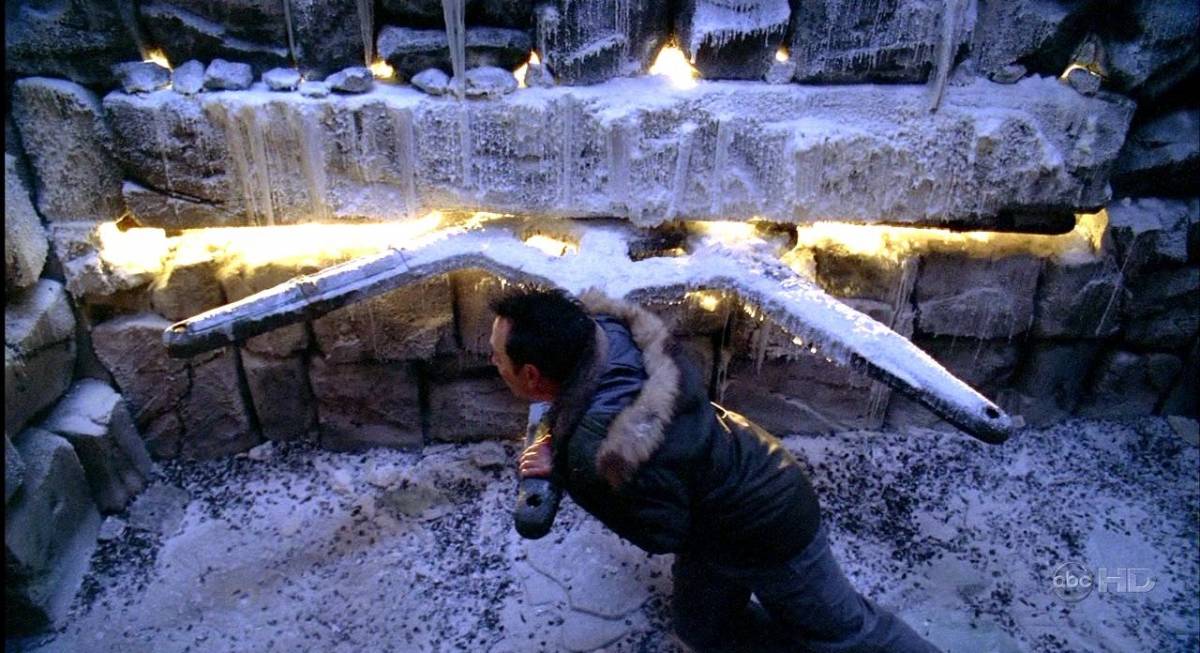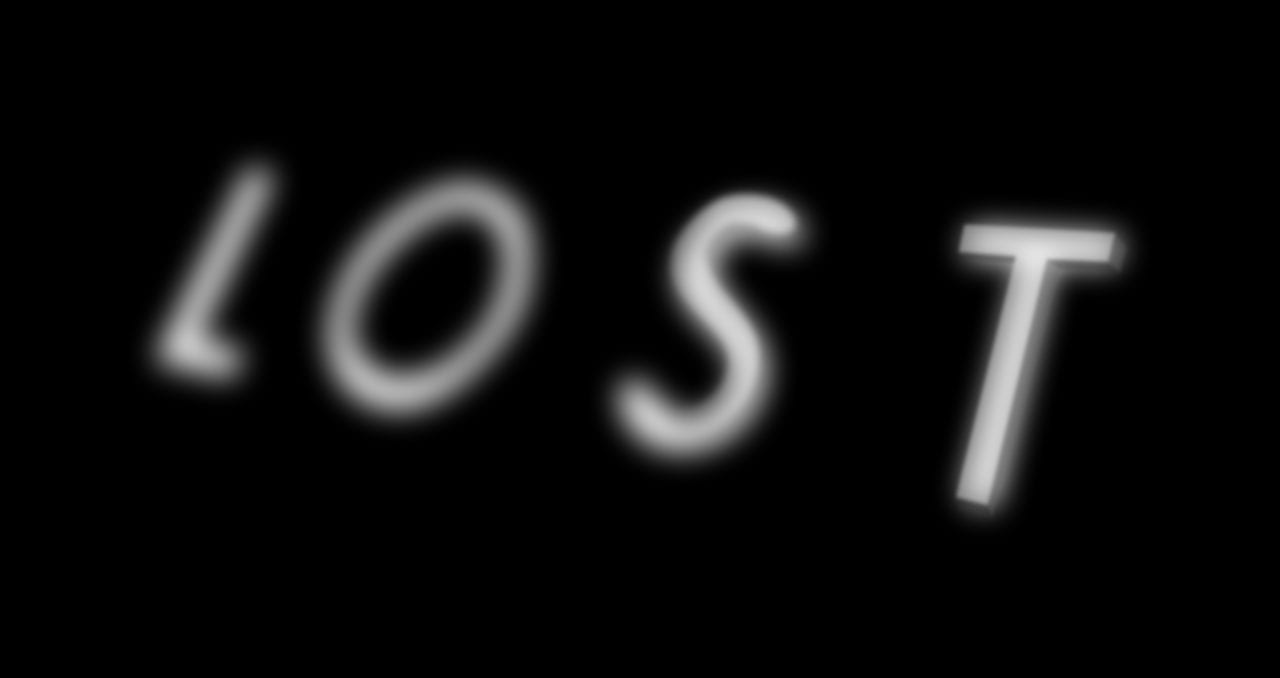Asking what The Island on Lost is would be the same as asking a Star Wars fan to explain The Force. These are complicated questions that require time, some hypothesis, and many examples to properly address. While both Lost and Star Wars are largely character-driven stories, what truly hooks us in both worlds is the unknown. On Lost, The Island is more than just a physical setting; in many ways, it’s a character of its own. In this article, I plan to explore what we know about The Island, what assumptions we can make about it, and what questions we’re still left to ponder and debate. Let’s get into this.
Electromagnetism
“Across the Sea” remains one of the most, if not the most polarizing hours of the entire series and also our furthest look back in Island history. While this isn’t confirmed, most Lost fans are in agreement that it was set right about 2,000 years before the events of the main story. While it may not have been the episode everyone wanted, to ignore what the episode gave us would be a great mistake. It was in this Jacob-centric episode that we learned about the “Heart of The Island” or the source of light. Protecting this cave of light was the job of the protector of The Island, a job that Jacob was not the first person to have, or even the second person to have. The episode left us wondering exactly how far back in time The Island had a protector and the true origin of this light.

Lost let us know very early in the series that electromagnetism was a force behind the mysterious happenings on The Island. It can be credited with the crashing of Oceanic 815, the fact that The Island was difficult to find, how Rose and Locke were seemingly cured of their respective cancers, and many more examples either through science or, in some cases, science with a little creative license. “Across the Sea” showed us the source of that magnetism and told us that protecting it was the most important job. As “Mother” passed the torch of protector to Jacob, she told him that the source was home to “life, death, and rebirth.” She also told him that going inside the cave was worse than death.
Our most reasonable explanation of what she meant comes from later in the episode when Jacob throws his brother in the cave and the Smoke Monster emerges. At the time, people speculated that this was the origin of the Smoke Monster, which is a theory I strongly reject. I am of the opinion that what we call the Monster existed before that: a deadly protector of The Island that could be summoned. Case in point: when Mother torched the village in “Across the Sea,” there was no way humanly possible that she could’ve done that alone, but there’s also no evidence to indicate that she herself was “part Monster.” The only rational explanation is that she called upon it to remove The Island of “The Others” inhabiting it. As for when Jacob threw his brother in the cave, it was a fate worse than death, like Mother warned. Jacob became immortal when he drank after Mother and accepted the job outside the cave. The Man in Black lost his physical form but became one with the Monster. It was still his thoughts, his feelings, and his beliefs inside his new form. He could appear as his old self, despite his body being laid to rest next to Mother in a cave. He was trapped, and thus began the conflict that carried throughout the narrative we witnessed.
Before we move on from the electromagnetic portion of this article, it’s important to reference the other places around the world that seemed to be connected to The Island due to their strong electromagnetic pockets. There was the Lamp Post in Los Angeles, which Eloise Hawking said was built to help find The Island since it was always moving. In Season 2’s Rose-and-Bernard-centric episode “S.O.S.,” Rose went to see a healer in Australia who mentioned various places around the world having “great energy,” including there in Australia. One also has to question if there’s a location somewhere in Guam, since the second plane flew through there in order to get back to The Island (although there isn’t more narrative proof to add to that hypothesis). Now, if Rose wasn’t “healed” while in Australia, and the Lamp Post was designed to find The Island, a very reasonable explanation to make is that The Island is the strongest of all these pockets of magnetism, although that seems pretty obvious, considering The Island was the only location hidden due to its levels of energy.
People
The next thing I would like to focus on is people coming to The Island. Claudia, the birth mother of Jacob and his brother, was on a ship that wrecked near The Island. A large number of passengers survived and inhabited The Island for many years until they were all killed by the woman we would only know as Mother. Jacob and his brother wouldn’t learn for many years that this “Mother” killed their birth mother and took them, and they also didn’t know for several years that other human beings lived on The Island. Mother would later explain to the boys that people were inherently bad and not to trust them, a belief that Jacob would reject and his brother would later embrace. Finally, Mother told the boys that she too wound up on The Island by accident.

Given everything stated in the previous paragraph, I believe there are a few conclusions we can make. Up until Jacob became protector of The Island, people were brought to The Island for one reason: to eventually replace the person who was currently the protector. Mother caused Claudia’s ship to wreck because she wanted her replacement. She murdered Claudia and took the babies because that was her way out. As she told Jacob when he took the job, you do it for as long as you can, then it’s up to you to find a replacement. The Island was a place of great importance, and having people around with their natural curiosities made the job of protecting the light difficult. It should be noted that Mother didn’t kill everyone else who survived the shipwreck (or have them killed) until they started to get too close to the light with their experiments, led by the Man in Black.
Once Jacob took over, with Mother dead and his brother now the embodiment of the Monster, the policy on people began to change. Sure, Jacob was also looking for his replacement, but he had a lot of options, as we discovered in “The Lighthouse” in Season 6. Jacob was different, though. He, as he stated, wanted people to have a choice, unlike him. Fate versus free will was always a central component of the series, and it all started here with Jacob. He wanted to prove that people weren’t all bad, so he brought various groups of people to The Island over the years. He didn’t intervene with their journey, however. If they died, they died. If they became corrupt, so be it. Jacob was simply giving people the opportunity to be and hoped in the process that they would prove his mother and brother wrong. As he told Jack, Kate, Sawyer, and Hurley in “What They Died For,” he didn’t pluck anyone out of a happy existence. He brought flawed people, people with huge problems in life, to The Island and gave them a chance to essentially start over. What they did with that opportunity was up to them.
The people that Jacob brought to The Island weren’t the only people there, however. The Dharma Initiative came to The Island for scientific reasons—exactly the kind of curiosity Mother feared. These people could wind up corrupting the light that was supposed to be protected at all costs. To keep the balance on The Island, the group originally known as “The Hostiles” (who were led by Richard Alpert along with various other leaders) served as Jacob’s militia. They allowed him to stay removed to continue his free-will experiments, all the while knowing that his primary focus of protecting The Island was being taken care of.
One final observation I wanted to make on the people of The Island was how many different cultures were represented. From the hieroglyphics in the Swan Hatch to the statue of Taweret, the Asian influences in The Temple and more, a lot of Island history can be written in our own minds. Jacob brought a lot of people from all over the world to The Island over the years, and judging by what was left behind, some people survived a long time there. These groups of people don’t fit into the history we’ve seen with The Others or the Dharma Initiative, but they nonetheless left their marks on The Island.
Time Travel and the Unexplained
Underneath the Orchid station, there was a giant wheel that Lost fans refer to as the “Frozen Donkey Wheel,” after being dubbed as such by Damon Lindelof and Carlton Cuse on the March 21, 2008 episode of The Official Lost Podcast. Ben turned that wheel, which not only took him from The Island to Tunisia but also “moved” The Island. This sequence of events was set in place after John Locke visited what he believed to be Jacob’s cabin and had a discussion with the Man in Black, who was appearing as Christian Shephard. John was given the instructions to move The Island, and since he didn’t know how, Ben took the task upon himself.

A few interesting observations here. As we saw in “Across the Sea,” the idea to use that wheel to harness the energy and the water to leave The Island was MIB’s, 2,000 years prior. To see him disguised in Christian’s body giving those instructions was noteworthy. It’s also noteworthy that even though John didn’t turn the wheel, he would later have to be the one to stop the wheel from spinning in Season 5’s “This Place is Death,” also taking John from The Island to Tunisia, which Charles Widmore would refer to as the exit. Moving the wheel caused The Island to bounce around through time, something that wasn’t happening elsewhere in the world, adding credibility to the notion that The Island was completely an entity of its own.
As if The Island didn’t have enough mysterious qualities and abilities, the whispers and the fact that “special” people can communicate with the dead also needs to be explored for the purposes of this essay, starting with the whispers. We learned in Season 6 when Michael appeared to Hurley that the whispers were, in fact, those who were dead but trapped in a limbo state of sorts, unable to “move on.” The dead could also appear on The Island and communicate with select people who had the ability to see and hear them. Some of the instances were Monster-related, with MIB posing as these dead people, but that wasn’t always the case. In cases such as Michael coming to Hurley in Season 6 and many others, the dead often had powerful messages to deliver, and on The Island, they were able to do so.
Final Conclusions
So what exactly do we know about The Island? We know that it’s connected to other electromagnetic pockets around the world and seems to be the strongest pocket of all. We know that it’s always moving, can’t be seen, and can be dislodged from time without impacting the rest of the world. We know that ghosts can exist there, that souls can be trapped, and that you have to be brought there by an immortal being. The Island has an exit point, and the source of light has to be protected at all costs (and has been seemingly back into B.C. times).
Knowing these things, we can begin to ask ourselves the bigger questions. Was there ever a time when there wasn’t a protector of The Island? Is the source of light and energy a life source in and of itself, essentially fueling the rest of the globe with its energy, remaining in hiding so the Earth can continue to function? Did life itself begin on The Island? While this may sound far-fetched, how would the first person know that The Island itself was special and needed to be protected at all costs? Could it be a scenario like with the Swan Hatch, where people continued to press the button because they didn’t want to be the one not to and risk the potential consequences? That’s plausible, but regardless, there’s no getting around the fact that The Island is someplace special and otherworldly.
Jacob turned The Island into a place where redemption was possible and where a person could exit the circumstances making their life so problematic and work on themselves from the inside. Starting over was possible, and clean slates were a real thing. More often than not, people died shortly after redeeming themselves in their own eyes, leading to the tired assumption that The Island was purgatory. No, the characters weren’t all dead the whole time, but The Island did serve as this middle ground between the real world and whatever’s next.
While we’re left to speculate about what exactly The Island’s function was in comparison to the real world, there’s no denying that, just like John Locke said all along, it was special. Let’s hear your thoughts and theories in the comments. Until next time, namaste and good luck!



Very cool, clear, succinct reflection. Almost a decade removed from the finale, and with my head cleared of a lot of other nutty speculations, the idea I keep coming back to is… the personalty of The Island across history, and to some degree, its very behavior, must first and foremost be understood in the context of its resident custodian. Meaning: I think The Island takes on the personality, interpretation, and what you might call theology of the person who serves as its high priest/administrator-protector. So, if Jacob thought it was a sacred place and a redemption machine… that’s what it was. The moment I think about a lot i/r/t the meaning The Island is the moment when Jack became its custodian for a very brief period of days. After Jack drank the anointing water, I believe it was Sawyer who asked him something like, ‘Do you feel any different?’ And Jack’s response was something like, ‘Nope.’ I think he expected what we expected: that drinking the water would bring a kind of enlightenment about The Island, specifically, that he would receive some download of user info — the operating system of The Island, if you will. Instead, what Jack got was a different kind of epiphany: the sobering realization that HE is the operating system of The Island. Whatever the custodian thinks, feels, believes, or decides about The Island — all those attitudes get imprinted on The Island. I think this was the unspoken meaning of the look between Jack and Hurley when Jack passed the mantle to Hurley. Jack’s knowing eyes said: ‘You get it now, don’t you?’ Hurley’s scared eyes said: ‘Oh, shit, yes, I do. It’s all on me now, in more ways than one. The responsibility — and the responsibility of making The Island’s meaning.’ Knowing Hurley as we do, we can understand why that would be so terrifying for him. And which makes his choice to ask Ben to help him all the more poignant and important. Because it would seem the history of Island custodians teaches us that the work of dictating The Island’s meaning shouldn’t be undertaken alone; that it becomes weird and corrupted by a caretaker’s selfishness, limitations, isolation and solipsism. Sharing that labor with another, with others? Better for The Island, better for them, and better for everyone.
we need a new series of LOST\